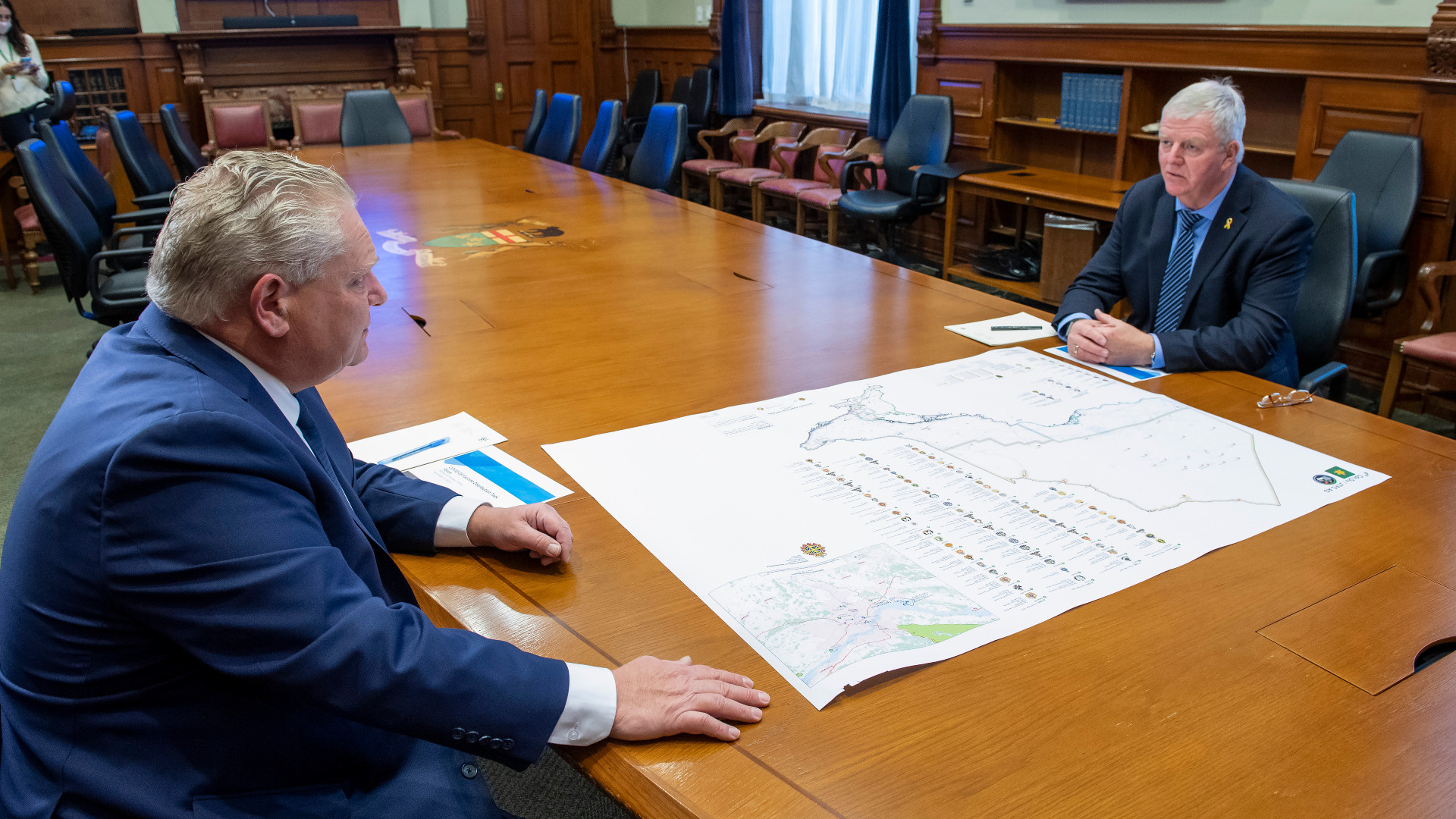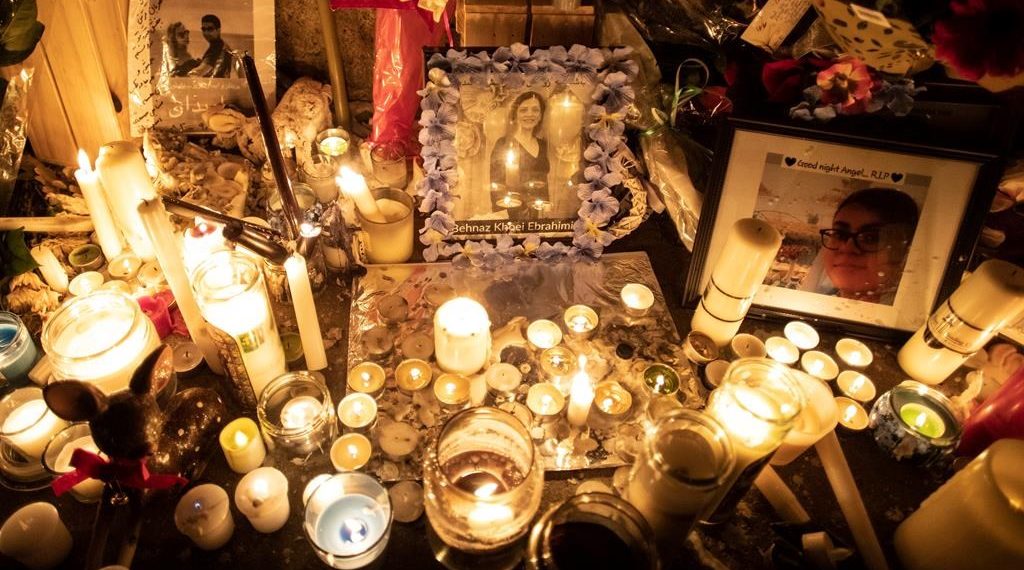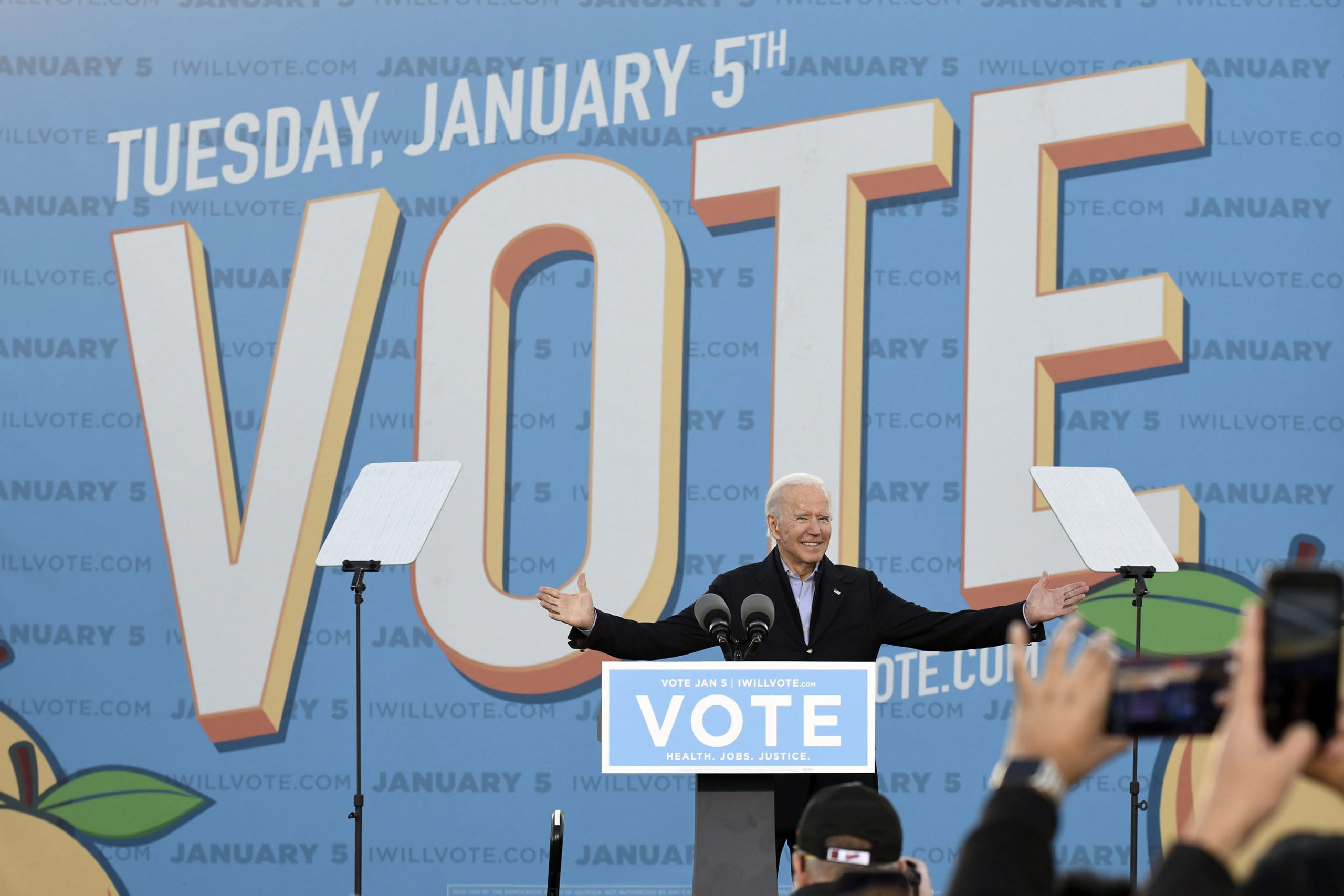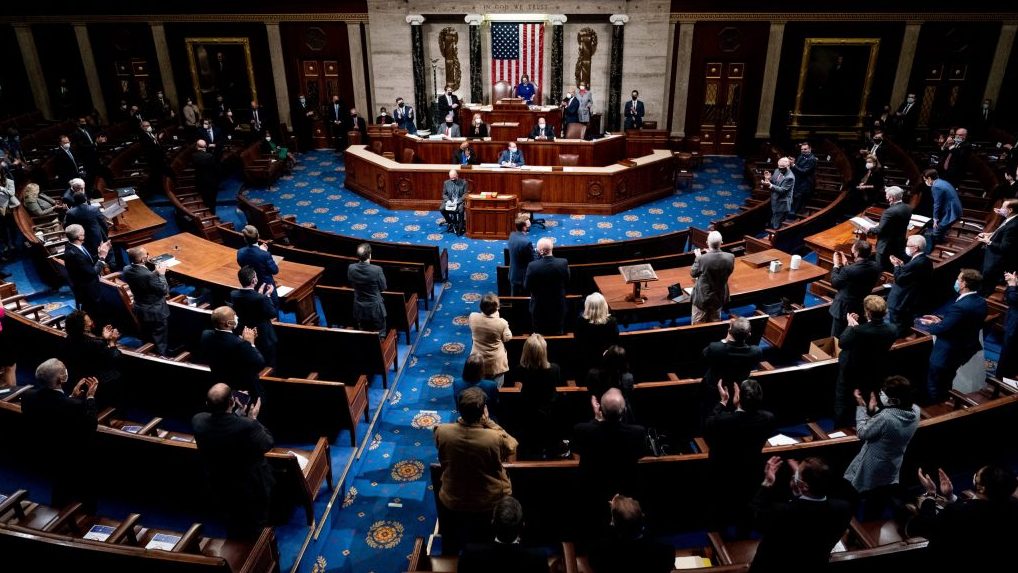Congress confirmed Democrat Joe Biden as the presidential election winner early Thursday after a violent mob loyal to President Donald Trump stormed the U.S. Capitol in a stunning attempt to overturn America’s presidential election, undercut the nation’s democracy and keep Trump in the White House.
Lawmakers were resolved to complete the Electoral College tally in a display to the country, and the world, of the nation’s enduring commitment to uphold the will of the voters and the peaceful transfer of power. They pushed through the night with tensions high and the nation’s capital on alert.
Before dawn Thursday, lawmakers finished their work, confirming Biden won the election.
Vice-President Mike Pence, presiding over the joint session, announced the tally, 306-232.
Trump, who had repeatedly refused to concede the election, said in a statement immediately after the vote that there will be a smooth transition of power on Inauguration Day.
“Even though I totally disagree with the outcome of the election, and the facts bear me out, nevertheless there will be an orderly transition on January 20th,” Trump said in a statement posted to Twitter by an aide.
The Capitol was under siege Wednesday, as the nation’s elected representatives scrambled to crouch under desks and don gas masks while police futilely tried to barricade the building, one of the most jarring scenes ever to unfold in a seat of American political power. A woman was shot and killed inside the Capitol, and Washington’s mayor instituted an evening curfew in an attempt to contain the violence.
The rioters were egged on by Trump, who has spent weeks falsely attacking the integrity of the election and had urged his supporters to descend on Washington to protest Congress’ formal approval of Biden’s victory. Some Republican lawmakers were in the midst of raising objections to the results on his behalf when the proceedings were abruptly halted by the mob.
Together, the protests and the GOP election objections amounted to an almost unthinkable challenge to American democracy and exposed the depths of the divisions that have coursed through the country during Trump’s four years in office. Though the efforts to block Biden from being sworn in on Jan. 20 were sure to fail, the support Trump has received for his efforts to overturn the election results have badly strained the nation’s democratic guardrails.
Congress reconvened in the evening, with lawmakers decrying the protests that defaced the Capitol and vowing to finish confirming the Electoral College vote for Biden’s election, even if it took all night.
Pence reopened the Senate and directly addressed the demonstrators: “You did not win.”
Republican Senate Majority Leader Mitch McConnell said the “failed insurrection” underscored lawmakers’ duty to finish the count. Democratic House Speaker Nancy Pelosi said Congress would show the world “what America is made of” with the outcome.
The president gave his supporters a boost into action Wednesday morning at a rally outside the White House, where he urged them to march to the Capitol. He spent much of the afternoon in his private dining room off the Oval Office watching scenes of the violence on television. At the urging of his staff, he reluctantly issued a pair of tweets and a taped video telling his supporters it was time to “go home in peace” — yet he still said he backed their cause.
Hours later, Twitter for the first time time locked Trump’s account, demanded that he remove tweets excusing violence and threatened “permanent suspension.”
A sombre President-elect Biden, two weeks away from being inaugurated, said American democracy was “under unprecedented assault,” a sentiment echoed by many in Congress, including some Republicans. Former President George W. Bush said he watched the events in “disbelief and dismay.”
The domed Capitol building has for centuries been the scene of protests and occasional violence. But Wednesday’s events were particularly astounding both because they unfolded at least initially with the implicit blessing of the president and because of the underlying goal of overturning the results of a free and fair presidential election.
Tensions were already running high when lawmakers gathered early Wednesday afternoon for the constitutionally mandated counting of the Electoral College results, in which Biden defeated Trump, 306-232. Despite pleas from McConnell, more than 150 GOP lawmakers planned to support objections to some of the results, though lacking evidence of fraud or wrongdoing in the election.
Trump spent the lead-up to the proceedings publicly hectoring Pence, who had a largely ceremonial role, to aid the effort to throw out the results. He tweeted, “Do it Mike, this is a time for extreme courage!”
But Pence, in a statement shortly before presiding, defied Trump, saying he could not claim “unilateral authority” to reject the electoral votes that make Biden president.
In the aftermath of the siege, several Republicans announced they would drop their objections to the election, including Sen. Kelly Loeffler, R-Ga., who lost her bid for reelection Tuesday.
Earlier, protesters had fought past police and breached the building, shouting and waving Trump and American flags as they marched through the halls, many without masks during the COVID-19 crisis. Lawmakers were told to duck under their seats for cover and put on gas masks after tear gas was used in the Capitol Rotunda. Some House lawmakers tweeted they were sheltering in place in their offices.
Rep. Scott Peters, D-Calif., told reporters he was in the House chamber when rioters began storming it. Security officers “made us all get down, you could see that they were fending off some sort of assault.”
He said they had a piece of furniture up against the door. “And they had guns pulled,” Peters said. Glass panes to a House door were shattered.
The woman who was killed was part of a crowd that was breaking down the doors to a barricaded room where armed officers stood on the other side, police said. She was shot in the chest by Capitol Police and taken to a hospital where she was pronounced dead. City police said three other people died from medical emergencies during the long protest on and around the Capitol grounds.
Staff members grabbed boxes of Electoral College votes as the evacuation took place. Otherwise, said Sen. Jeff Merkley, D-Ore., the ballots likely would have been destroyed by the protesters.
The mob’s storming of Congress prompted outrage, mostly from Democrats but from Republicans as well, as lawmakers accused Trump of fomenting the violence with his relentless falsehoods about election fraud.
“Count me out,” said Trump ally Sen. Lindsey Graham, R-S.C. “Enough is enough.”
Several suggested that Trump be prosecuted for a crime or even removed under the Constitution’s 25th Amendment, which seemed unlikely two weeks from when his term expires.
“I think Donald Trump probably should be brought up on treason for something like this,” Rep. Jimmy Gomez, D-Calif., told reporters. “This is how a coup is started. And this is how democracy dies.”
Sen. Ben Sasse, R-Neb., who has at times clashed with Trump, issued a statement saying: “Lies have consequences. This violence was the inevitable and ugly outcome of the President’s addiction to constantly stoking division.”
Despite Trump’s repeated claims of voter fraud, election officials and his own former attorney general have said there were no problems on a scale that would change the outcome. All the states have certified their results as fair and accurate, by Republican and Democratic officials alike.
Punctuating their resolve, both the House and Senate soundly rejected an objection to election results from Arizona, which had been raised by Sen. Ted Cruz, R-Texas, and Rep. Paul Gosar, R-Ariz., and another from Pennsylvania brought by Sen. Josh Hawley, R-Mo., and Rep. Scott Perry, R-Pa. Still, most House Republicans supported the objections. Other objections to results from Georgia, Michigan, Nevada and Wisconsin fizzled.
The Pentagon said about 1,100 District of Columbia National Guard members were being mobilized to help support law enforcement at the Capitol. Dozens of people were arrested.
Associated Press writers Jill Colvin, Zeke Miller, Kevin Freking, Alan Fram, Matthew Daly, Ben Fox and Ashraf Khalil in Washington and Bill Barrow in Atlanta contributed to this report.

Quebecers need to be jolted into recognizing the seriousness of the COVID-19 pandemic, Premier Francois Legault said Wednesday, before announcing a provincewide 8 p.m. curfew for the next four weeks.
Legault said despite the fact schools, retail stores and many other businesses have been closed since December, COVID-19 infections and related hospitalizations continue to rise. Too many seniors are ending up in hospital after becoming infected in private homes, he added.
“We are obliged to provide a type of shock treatment so that people reduce their visits,” he told reporters. Quebec will become the first province in the country to impose such a drastic measure to curb the spread of the novel coronavirus.
Beginning Saturday and until at least Feb. 8, Quebecers will be under a curfew from 8 p.m. to 5 a.m., Legault said, adding that anyone caught breaking the rules is liable to a fine between $1,000 and $6,000. The government is considering creating a document for people who have to be out after the curfew, which they can show police.
“When we say we are giving an electroshock it’s really for four weeks, a period that should make a difference,” Legault said.
“The police are important allies in the fight against the virus,” he added. “I need the police and Quebec needs the police to be able to succeed with this shock treatment during the next four weeks.”
The premier said all non-essential businesses that he ordered closed in December will remain closed until at least Feb. 8, when the curfew is scheduled to be lifted.
Legault, however, said primary schools will reopen as scheduled, on Jan. 11, and high school students will return to in-person learning the week after, on Jan. 18. “Our children have to be able to continue to learn,” he said.
Speaking before Legault’s news conference, Dr. Donald Sheppard, chair of the microbiology and immunology department at McGill University, said the government needed to explain the logic behind a curfew because the majority of outbreaks documented by public health have been in workplaces and schools.
Public health director Dr. Horacio Arruda said the curfew is part of a series of measures aimed at reducing the possibility of gatherings and of contact between people. “There’s no science that can tell you what measure will have what percentage effect,” he told reporters.
Arruda said he believes many small gatherings around Christmas led to the large number of COVID-19 cases being reported in Quebec.
Earlier on Wednesday, Quebec reported 2,641 new COVID-19 infections and 47 more deaths attributed to the novel coronavirus. The Health Department said hospitalizations jumped by 76, to 1,393 – the largest number since late May – and 202 people were in intensive care, a rise of eight.
Despite calls from some health experts to shut down the manufacturing and construction sectors, Legault said the government won’t close factories or order work sites to stop operating. Factories, he said, have been asked to postpone “non-essential” manufacturing. The type of production that will be designated “essential” will be decided, he explained, following discussions between manufacturers and government officials.
The majority of people in hospital with COVID-19 are over 65 years old and are unlikely working in the manufacturing sector, Legault said, in an attempt to explain his decision. Arruda said many factories are producing essential products such as food and can’t be closed.
Quebec’s health-care system is under heavy strain, Health Minister Christian Dube said, adding that some kidney transplants have been cancelled. That sort of strain is worrying for experts like Sheppard who said surgeries and cancer screenings are being put off and intensive care units are filling up,
“The biggest worry is, eventually, if we don’t do anything, we’ll get to the point where it’s going to be the decision where we have two patients, one ventilator and someone has to decide,” Sheppard said in an interview Wednesday.
He said the impact of cancelled procedures is already being felt: breast cancer patients are presenting with larger tumours than they were before the pandemic, a sign that they’re being diagnosed late.
Quebec’s INESSS institute, a government-mandated health-care think tank, warned on Dec. 31 that hospitals in the Montreal area are likely to run out of dedicated COVID-19 beds within three weeks.
Much of Quebec, including the province’s largest cities, has been under partial lockdown since October, when bars, restaurant dining rooms, gyms and entertainment venues were closed. In December, Legault closed all “non-essential” retail stores and extended the winter break for elementary and high school students.
Quebec has reported an average of 2,597 new cases a day over the past week, Health Minister Christian Dube said on Twitter Wednesday.
That figure represents 300 cases a day per million people – more than any province in Canada. The next highest is Alberta with 233.8 cases per million, followed by Ontario with 221.9, according to a report released Wednesday by National Bank Financial Markets based on data from Johns Hopkins University.
Officials said 6,221 doses of vaccine were administered Tuesday, for a total of 38,984. Quebec has reported 217,999 COVID-19 infections and 8,488 deaths linked to the virus since the beginning of the pandemic.

The 2021 Grammy Awards will no longer take place this month in Los Angeles and will broadcast in March due to a recent surge in coronavirus cases and deaths.
The Recording Academy told The Associated Press on Tuesday that the annual show would shift from its original Jan. 31 broadcast to an unspecified date in March.
The Grammys will be held in Los Angeles at the Staples Center. Los Angeles County, the epicenter of the crisis in California, has surpassed 10,000 COVID-19 deaths and has had 40% of the deaths in California. It is the third state to reach the 25,000 death count.
An average of six people die every hour from COVID-19 in Los Angeles County, which has a quarter of the state’s 40 million residents. County health officials fear the incoming Christmas and New Year’s surge.
“The Daily Show” host and comedian Trevor Noah is set to host the 2021 Grammys, where Beyonce is leading contender with nine nominations. She scored nominations for song and record of the year with “Black Parade,” which she released on Juneteenth, while “Savage” _ her No. 1 collaboration with Megan Thee Stallion _ picked up bids for record of the year, best rap song and best rap performance.
Beyonce’s “Black Is King,” which aired on Disney+, is nominated for best music film while “Brown Skin Girl,” a song dedicated to dark- and brown-skinned women, is nominated for best music video. Her daughter Blue Ivy Carter sings on “Brown Skin Girl” and also earned a Grammy nomination.
Taylor Swift, Dua Lipa, Roddy Ricch, Jhene Aiko, Post Malone, Renee Zellweger, Billie Eilish and her producer-brother Finneas also scored nominations. First-time nominees include The Strokes, Megan Thee Stallion and Harry Styles.
Since the pandemic, a number of awards show were postponed and later revamped due to COVID-19 restrictions. The BET Awards was the first major awards show during the pandemic and was a success thanks to its artsy, highly produced, well-crafted pre-taped performances. The MTV Video Music Awards featured Lady Gaga winning awards and performing onsite in a mask, and the Latin Grammys pre-taped several performances the week of the show, handing out some of its awards to the winners who attended the show.
Performers at the upcoming Grammys will be announced at a later date.

After a slow start to the vaccine roll out program, Ontario’s vaccine task force now says it will soon run out of doses if allocations for the province do not increase in short order.
In a task force meeting on Tuesday, Gen. Rick Hillier said over 10,000 people are being vaccinated in Ontario daily, with a focus on long term care workers and residents.
So far more than 50,000 people have been vaccinated across the province, almost exclusively with the first shipment of the Pfizer vaccine.
He explained that around 35,000 doses from the initial shipment of 95,000 were held back to ensure a second dose would be available to those vaccinated 21 days after the first.
The second round of shots began being administered on Monday and any excess Pfizer doses are being carefully moved for use in long term care homes Wednesday, as the pharma giant recently relaxed regulations on transporting the vaccine. Hillier said that supply will be exhausted by the weekend.
Another shipment of 47,000 Pfizer vaccines is expected by Wednesday and at the rate vaccinations are taking place, that shipment will run out by the end of the following week, Hillier added.
“We still do not know when the shipment [of Pfizer vaccines] that was predicted for next week will arrive,” said Hillier.
Premier Doug Ford urged the federal government to increase vaccine supply to the province.
“Our message to the federal government — just keep these vaccines coming,” he said.
Ford admitted there were “bumps in the road” as Ontario lags behind other provinces in terms of vaccination numbers per capita, but says he is confident the province will emerge a leader in this race.
“It might take us a week, maybe a couple of weeks to ramp up, but once we get the machine going in Ontario, we kick butt anywhere in the country,” he said. “Once we put team Ontario behind it, we become the leaders and we will become the leaders in North America.”
In addition to the Pfizer vaccine, Hillier provided an update on Moderna shipments, saying the initial delivery of 55,000 doses received on Dec. 30 were and are being used in long term care facilities since they can be transported better than Pfizer’s vaccine.
The second shipment of Moderna vaccines is due to arrive next week and will be reserved for the second dose required by long term care home residents.
Hillier said they are also launching vaccination programs in northern, isolated communities including James Bay and Sioux Lookout on Thursday or Friday. About 10,000 doses from the second Moderna shipment will be used for workers and residents in long term care facilities in those areas.
Earlier in the day, the province announced that residents and workers at long-term care homes in the hot zones of Toronto, Peel Region, York Region and Windsor-Essex will all get the shot by Jan. 21.
“The allocations of vaccines arriving in Ontario … are small and so as the number of people who await their second needle grows on a daily basis, our space to move beyond that is limited in the extreme,” said Hiller, adding that their goal to move beyond southern Ontario is being hampered. “Its going to be extremely difficult to do that and any other part of the mission unless those allocations increase.”
He added that since the vaccine is a two-dose program, the task force’s flexibility to use all the doses delivered is restricted and will continue to be so into March.
“We could use more doses, thousands more,” he said.

The United States derailed the previously undefeated Canadian juggernaut, beating the host squad 2-0 Tuesday to capture the gold medal at the world junior hockey championship.
The U.S. players poured over the bench as the buzzer sounded, tossing sticks and gloves aloft in an empty Rogers Place. The tournament was played with no fans in the stands to prevent the spread of COVID-19.
U.S. winger Trevor Zegras led the way, scoring a goal and adding an assist. American goaltender Spencer Knight, a 2019 top pick by the Florida Panthers, turned aside 34 shots for his third shutout of the tournament, tying the record set by Canada’s Devon Levi this year and by Justin Pogge in 2006.
It’s the first gold medal for the Americans since they won it all in 2017.
Canada took home the silver medal. Finland defeated Russia 4-1 earlier Tuesday to win bronze.
Zegras, a 2019 first-round draft pick of the Anaheim Ducks, was the top scorer of the tournament (seven goals, 11 assists).
Alex Turcotte also scored the U.S.
Knight was spectacular at times, particularly when the Canadians stormed and buzzed the net late in the second period and came in waves in the third.
Knight stoned Connor McMichael on a breakaway with three minutes left in the game, prompting the Canadian to slam his stick on the glass in frustration.
Levi made 19 saves in the loss.
Canadian forward Dylan Cozens, tied with Zegras in tournament scoring heading into the final, finished as Canada’s top point getter, with eight goals and eight assists.
The U.S. lost its tournament opener 5-3 to Russia before running the table, outscoring opponents 36-10.
Canada had been absolutely dominant, going undefeated and outscoring opponents 41-4 heading into the gold-medal match.
The players battled to a continuous hum of canned crowd noise throughout the game, including ‘oohs’ and ‘aahs’ on hard shots and great saves.
Rogers Place, home to the Edmonton Oilers, was otherwise empty except for hockey officials, media, rink and support staff.
The game featured two Florida draft picks in net: Levi, a seventh-round pick in 2020 and Knight.
The U.S. forechecked ferociously in the first period, outshot Canada 13-9 and opened the scoring at 13:25 when Turcotte deflected a Drew Helleson point shot up and over Levi’s glove.
To that point, Canada had never trailed in the tournament.
The U.S. took a 2-0 lead just 32 seconds into the second period. Arther Kaliyev fired the puck past the net. Zegras grabbed the puck off the end boards and tucked it in on the short side while Levi, expecting puck to come out the other side, was moving in the opposite direction to cover the far post.
The Americans held off Canada in third to preserve the victory.

The CEO of St. Joseph’s Health System and Niagara Health, Dr. Tom Stewart, has resigned from Ontario’s COVID-19 advisory board after travelling to the Dominican Republic over the holidays.
A statement from the Senior Vice President of St. Joseph’s Brian Guest said Stewart had been approved for vacation from Dec. 18 and Jan. 5 and during that time, he travelled to the Dominican Republic.
Stewart said he “regret[s]” this non-essential travel and apologized. “I recognize everyone should be avoiding non-essential travel now, including me.”
“As a health system leader, my actions in no way reflect the tireless dedication and commitment of the staff at St. Joseph’s Health System, who continue to live the legacy of our organization every day,” said Stewart in the statement.
He is currently self-isolating at home for two weeks.
St. Joseph’s Health System is made up of several different health sites in Niagara, Hamilton, Brantford, Kitchener & Guelph.
Deputy Minister of Health Helen Angus release a statement late Tuesday night saying she had accepted his resignation from the Ontario COVID-19 Science Advisory Table, the LTC Incident Management System Table and the Health Coordination Table,.
“The people of Ontario have made countless sacrifices during the pandemic and it remains critically important that everyone continues to follow public health advice,” read the statement.
In March, the Ministry of Health welcomed Stewart to the government’s Command Table that was set up to provide strategic direction to the province about the novel coronavirus outbreak.
A number of politicians have recently admitted to leaving the country over the December holiday period, even as their constituents adhered to public health guidance meant to curb the spread of COVID-19, including Ontario Finance Minister Rod Phillips who has since resigned from his role.
The federal and provincial government have both repeatedly asked Canadians not to travel abroad during the pandemic and urged citizens to avoid gathering with family outside their household over the holidays.
Earlier Tuesday, Prime Minister Justin Trudeau expressed disappointment in federal and provincial politicians who have travelled abroad, despite months of recommendations against non-essential travel.

The Ontario government says it won’t extend an inquiry into COVID-19’s deadly spread in long-term care homes after those leading the probe appealed for more time.
Minister of Long-Term Care Merrilee Fullerton says the inquiry’s final report and recommendations are still expected by April 30.
The commissioners heading the inquiry had written to Fullerton last month asking for an extension until Dec. 31, 2021 to complete their work.
Their letter, dated Dec. 9, 2020, noted delays in receiving government information relevant to the inquiry and the large amounts of data being collected.
But Fullerton — in a letter dated Dec. 23 and posted on the inquiry’s website Monday — replied that there is still a great need for timely information to inform decisions as the pandemic continues.
“The urgency of our situation has not changed,” she wrote. “The need for timely and focused advice is even more acute.”
Fullerton said the commissioners should focus on areas that require immediate action and highlight issues that warrant further government examination in their report.
Both letters were posted to the Long-Term Care COVID-19 Commission’s website on Monday as the province reported 219 long-term care homes with active outbreaks.
That represents 35 per cent of all care homes in Ontario, with 1,160 residents and 1,140 staff members currently infected with the virus, according to provincial data.
The province says 11,369 long-term care residents have tested positive for the virus since the pandemic began.
The virus has killed 2,795 people living in long-term care homes, the province says, with 14 deaths reported on Sunday.
The commission flagged lack of provincial oversight and uneven management standards in an interim report on the grim situation last month.
The report pointed to a provincial decision in the fall of 2018 to end comprehensive inspections and a lack of enforcement when issues are found.
It found that fines and prosecutions are rarely applied on home operators, leaving a lack of urgency to address violations.

Ontario Premier Doug Ford defended his government’s COVID-19 vaccine program Monday as a health-care worker became the first person in the province to receive both doses of one of the shots.
Anita Quidangen was given her second dose at Toronto’s University Health Network, the first of five health-care workers slated to cross that milestone Monday.
Quidangen said she hopes others will follow in her footsteps as the province continues its rollout of two COVID-19 vaccines.
Ford, who was present as the health-care workers received their shots, acknowledged there have been “a few bumps in the road” in the province’s immunization campaign but said he is confident in the plan.
“We’re ramping it up and you’re going to see a significant difference over the next few weeks,” the premier said.
Critics, including some in the medical field, have said the province is not moving fast enough with inoculations.
A decision to temporarily close immunization clinics over the holidays was met with widespread outrage last week, prompting the retired general heading the vaccine rollout to admit the move was a mistake.
As of 8 p.m. on Sunday night, the province said 42,419 COVID-19 vaccine doses had been administered in Ontario. Of those, 4,808 doses were administered Sunday.
Meanwhile, students across Ontario returned to the virtual classroom on Monday as part of a provincewide lockdown.
Students in northern Ontario and elementary students in southern Ontario will resume in-person learning next week.
High schoolers in southern Ontario will continue online learning until Jan. 25.
The move is part of a provincial lockdown that began on Boxing Day and is set to last until Jan. 9 in northern Ontario and Jan. 23 in southern Ontario.
Asked whether the province would consider extending remote learning in light of an ongoing surge in COVID-19 cases, a spokeswoman for Education Minister Stephen Lecce said the government will continue to follow the advice of medical experts in making those decisions.
Ontario reported 3,270 new cases of COVID-19 on Monday, and 29 new deaths related to the novel coronavirus.
Health Minister Christine Elliott said 917 cases were in Toronto, 581 in Peel, 389 in York Region and 246 in Windsor-Essex County.
There were 1,190 people hospitalized with COVID-19 in Ontario, including 333 patients in intensive care.

A broken cellphone and a muddied wallet were the only possessions Alireza Ghandchi received from Iran after his wife and two children were killed in a Ukrainian plane crash last year.
“No luggage, no dolls, no anything,” he said.
His son, Daniel, was eight-years-old and his daughter, Dorsa, was just three days shy of turning 16. The family from Richmond Hill, Ont., was returning home after spending the holidays in Iran when their plane — Ukraine International Airlines flight PS752 — was shot down by the Iranian army.
Ghandchi says his last conversation was with his daughter about 90 minutes before the flight while his wife, Faezeh, was checking in.
Everything was fine, Dorsa told him.
Now, pictures of his family fill his walls and memories of them fill his heart. When it gets overwhelming, Ghandchi goes into his storage, smells his wife’s perfume, hugs his children’s clothes and cries.
Ghandchi says there are times when nothing at all can help him with the grief of losing his entire family.
All 176 passengers on board the Ukraine passenger jet died in the crash on Jan. 8, 2020. There were 138 people on board with ties to Canada.
A year later, families cling to memories of their lost loved ones along with a few mementoes they received from the Iranian authorities.
Not all of the passengers’ personal possessions were destroyed in the crash. There were reports of looting at the site of the crash and some of the victims’ families have accused Iranian authorities of withholding valuable items such as jewelry, cellphones and cash.
Ralph Goodale, who is Ottawa’s special adviser on the Ukrainian plane crash, blasted Iran in a recent report for its treatment of the victims’ families, including the “withholding of personal effects.”
For Amirali Alavi, who lost his mother, Neda Sadighi, in the tragedy, the past year has been “one devastating blow after another.”
He received her pristine boarding pass, a few crumpled rings, a destroyed laptop, a few credit cards and identification — but no wallet, no luggage, no carry-on. Most of her jewelry was missing as was the cash she carried.
“Some of these things don’t have monetary value, but they have a lot of sentimental value to the families,” Alavi said. “It feels like psychological warfare.”
Alavi is not alone.
Several other families say they’ve received little to nothing of their loved ones’ possessions back from Iran, which further compounds their grief.
Most of the relatives have banded together to form the Association of Families of Flight PS752 Victims. With contacts throughout Iran, they’re doing their own investigation, Alavi said.
They’ve unearthed video of the crash site that shows officials going through passengers’ bags and sorting them into bins, he said.
“They’re separating the contents, taking them out without any effort of preserving them and tossing the bags in one box, belongings in the other box,” Alavi said.
“Nobody knows what happened to them.”
He said one family got back a laptop without its hard drive, while another received a leather bracelet without its gold pieces.
Tensions were running high on the day the Ukrainian plane was downed.
Hours before the crash, Iran launched an attack on U.S. military forces at two airbases in Iraq in retaliation for the killing of Qasem Soleimani, a feared general and head of the Quds Force of the Islamic Revolutionary Guard.
Alavi, a law and business student at the University of Toronto, watched an online flight tracker as PS752 took off at 6:12 a.m. Tehran time, more than an hour late from its scheduled departure time. He felt a sense of relief when the site showed the plane making its way into Azerbaijan airspace.
He was excited to have his mother back. In 2010, Sadighi, an ophthalmologist, gave up her practice in Iran and moved to Canada with her husband, Farzad Alavi, a doctor, hoping for a better life for their son.
The tracking site Alavi watched that night was wrong. Six minutes after takeoff, the plane was hit by ground-to-air missiles and crashed into a children’s playground.
Iran said the takedown was human error, which many families do not believe.
Mahmoud Zibaie also tracked the flight online. He even took a video of the tracking technology to later show it to his computer-savvy 15-year-old daughter, Maya, who was on the plane with his wife, Shahrzad Hashemi.
A few minutes after takeoff, he left to brew some tea. By the time he returned to his computer, the plane had vanished from the screen. He soon saw reports of the crash on social media.
His pain and anguish remain fresh and he is overwhelmed at times by feelings of guilt. Zibaie was supposed to be on that plane with his family, but he came home a few days earlier because he worried about taking too much time off from his new job.
“It’s very, very, very tough still, the wound is fresh. And I believe that it will take a very long time to heal,” he said.
Like several other families, Zibaie has channelled much of his grief towards building a school in an impoverished part of Iran.
Zibaie still looks at Maya’s first email she sent when she was four years old — a painting she made on the computer — for comfort. His wife was a decorative painter and his daughter had inherited her talents.
He applied to immigrate to Canada in 2006 when Maya was two years old. They landed in Toronto in 2016. Four years later, he buried his wife and daughter in Tehran.
Zibaie found he could no longer live in the same home in Toronto so he moved to Ottawa.
“Every place I went was a memory,” he said. “It was too hard.”
He, too, wishes for more of his family’s belongings back.
He has gotten back his daughter’s burned passport and some of his wife’s banking cards.
“That’s all I’ve gotten back,” he said. “It hurts.”
Arman Abtahi was relieved when his brother’s remains arrived in a sealed coffin so the last memory of him would be of the final time the family had seen him — smiling and waving goodbye.
He had hoped the Iranian authorities would send back his brother’s ring so their mother could have something of her 37-year-old son.
“We didn’t get back anything,” he said. “Not his luggage, not his watch, not his ring, we just got his body.”
Abtahi’s brother was a postdoctoral scholar at the University of British Columbia. He had gone to Iran to celebrate his first wedding anniversary because his wife’s visa to Canada was rejected.
The last thing Abtahi told his brother was that he would pick him up at the airport.
“Instead, I went to the airport to go back to Iran to bury him,” he said.

Political observers are casting Georgia’s Senate runoff elections as pivotal to U.S. President-elect Joe Biden’s ability to make decisions that will affect the entire United States, and in some cases, the entire world.
“It’s about literally life or death for communities all across this country,” said Democratic strategist Antjuan Seawright. “Because if Joe Biden and Kamala Harris do not have a collective Congress to help them pass necessary legislation that will move this country forward, what are we going to be able to do?”
On Tuesday, Georgians will cast their ballots for the state’s two outstanding Senate seats. The outcome will decide which party will have the upper hand in the upper chamber.
Seawright tells 680 NEWS the stakes include whether laws get passed, potentially boosting Biden’s policy priorities, both domestic and foreign.
“That’s why you see so much attention around Georgia and making certain people understand how high the stakes are,” he said.
Democrats have a president in the White House and run the House of Representatives. Republicans currently control the Senate. A Democratic sweep in the runoffs would lead to a 50-50 split, in which case, tie-breaking votes would go to Vice President-elect Kamala Harris.
Sarah Goldfeder, a former U.S. diplomat under two American ambassadors, is in favour of a gridlocked Congress.
“I do think having a tight government, having very tight margins in the House and very tight margins in the Senate are better for government and better for America overall,” she said.
Whoever wins will hold only a slim Senate margin, says Goldfeder, now an Ottawa-based consultant. That will make it harder to implement significant legislative changes.
“In many ways you can think of it like a minority government here in Canada. They have to negotiate,” she said. “If the Republicans want something or the Democrats want something, they’re going to have to win over their more moderate members.”
Regardless of what happens Tuesday, Seawright says these races will shape the coming years in U.S. politics.
“This election in Georgia is about who will be able to govern effectively and get things done for the collective United States of America,” he said.









